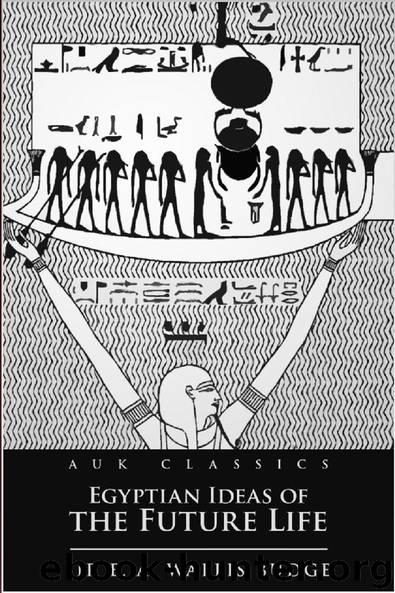Egyptian Ideas of the Future Life by E. A. Wallis Budge

Author:E. A. Wallis Budge
Language: eng
Format: epub
Tags: ancient, history, religion, egyptian, egypt, egyptians, gods, egyptology, beliefs
ISBN: 9781781664810
Publisher: Andrews UK Limited 2012
Published: 2012-06-13T00:00:00+00:00
CHAPTER IV.
THE JUDGMENT OF THE DEAD.
The belief that the deeds done in the body would be subjected to an analysis and scrutiny by the divine powers after the death of a man belongs to the earliest period of Egyptian civilization, and this belief remained substantially the same in all generations. Though we have no information as to the locality where the Last Judgment took place, or whether the Egyptian soul passed into the judgment-hall immediately after the death of the body, or after the mummification was ended and the body was deposited in the tomb, it is quite certain that the belief in the judgment was as deeply rooted in the Egyptians as the belief in immortality. There seems to have been no idea of a general judgment when all those who had lived in the world should receive their reward for the deeds done in the body; on the contrary, all the evidence available goes to show that each soul was dealt with individually, and was either permitted to pass into the kingdom of Osiris and of the blessed, or was destroyed straightway. Certain passages in the texts seem to suggest the idea of the existence of a place for departed spirits wherein the souls condemned in the judgment might dwell, but it must be remembered that it was the enemies of Rā, the Sun-god, that inhabited this region; and it is impossible to imagine that the divine powers who presided over the judgment would permit the souls of the wicked to live after they had been condemned and to become enemies of those who were pure and blessed. On the other hand, if we attach any importance to the ideas of the Copts upon this subject, and consider that they represent ancient beliefs which they derived from the Egyptians traditionally, it must be admitted that the Egyptian underworld contained some region wherein the souls of the wicked were punished for an indefinite period. The Coptic lives of saints and martyrs are full of allusions to the sufferings of the damned, but whether the descriptions of these are due to imaginings of the mind of the Christian Egyptian or to the bias of the scribe's opinions cannot always be said. When we consider that the Coptic hell was little more than a modified form of the ancient Egyptian Amenti, or Amentet, it is difficult to believe that it was the name of the Egyptian underworld only which was borrowed, and that the ideas and beliefs concerning it which were held by the ancient Egyptians were not at the same time absorbed. Some Christian writers are most minute in their classification of the wicked in hell, as we may see from the following extract from the life of Pisentios, [84] Bishop of Keft, in the VIIth century of our era. The holy man had taken refuge in a tomb wherein a number of mummies had been piled up, and when he had read the list of the names of the people who had been buried there he gave it to his disciple to replace.
Download
This site does not store any files on its server. We only index and link to content provided by other sites. Please contact the content providers to delete copyright contents if any and email us, we'll remove relevant links or contents immediately.
Men In Love by Nancy Friday(4337)
Everything Happens for a Reason by Kate Bowler(4074)
The Immortal Life of Henrietta Lacks by Rebecca Skloot(3831)
Why We Sleep by Matthew Walker(3779)
The Sports Rules Book by Human Kinetics(3594)
Not a Diet Book by James Smith(2739)
The Emperor of All Maladies: A Biography of Cancer by Siddhartha Mukherjee(2435)
Sapiens and Homo Deus by Yuval Noah Harari(2419)
Day by Elie Wiesel(2246)
Endless Forms Most Beautiful by Sean B. Carroll(2086)
Angels in America by Tony Kushner(2052)
A Burst of Light by Audre Lorde(1982)
Hashimoto's Protocol by Izabella Wentz PharmD(1901)
Dirty Genes by Ben Lynch(1859)
Reservoir 13 by Jon McGregor(1856)
Stretching to Stay Young by Jessica Matthews(1717)
Fat for Fuel by Joseph Mercola(1699)
The Immune System Recovery Plan by Susan Blum(1696)
Boost Your Brain Power in 60 Seconds by Michelle Schoffro Cook(1679)
